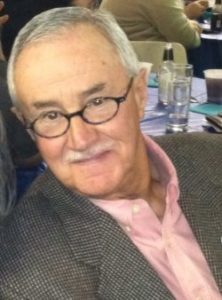by Mike Pyatt

Is God’s habitation in our realm as inevitable as silence to a bucolic scene, or the ascending smoke from a dying ember? Or have we descended into a sinister flirtation with the Divine? It wasn’t so in 1941. The day after Japan’s surprise attack on Pearl Harbor, a somber, but resolute President Franklin Roosevelt, after strapping on steel braces to his legs, hobbled awkwardly into the U.S. House chamber. He addressed a joint session of Congress, and asked for a declaration of war against Japan. During times of tumult and travail, most Americans expect our country to prevail victoriously. At the end of Roosevelt’s address, he’d verbalized what most citizens believed, “With confidence in our armed forces, with the unbounded determination of our people we will gain the inevitable triumph. So help us God.” Was it arrogant presumption? Or implacable reliance on His benevolence in our battle against evil? History’s punctuated by God’s intervention in space and time.
General George C. Marshall, referenced his unswerving confidence in, “Our Heavenly Father,” quoting a line from President Abraham Lincoln, as the War Department dispatched innumerable Western Union condolences to families who’d lost a loved one during WWII. Whether we are battling a foreign enemy, or reeling after a major natural disaster, historically we’ve invoked God’s help and sustaining direction. We’d be shocked to hear a president say, “We can do this on our own, and we don’t need divine intervention.”
At the first hint of a “breaking news alert” on our 24/7 news cycle, most anchors promptly add, “Our thoughts and prayers are with them.” Whether it’s sincere, it’s nearly a knee-jerk reaction. Is it in our DNA? Most atheists reject that notion. However, one knows there are few in fox holes, or in the midst of disaster. Acknowledging God during such upheaval is what defines our country. One of the few occasions that the GOP and Democrats won’t draw swords. Picture Senators Chuck Schumer and Mitch McConnell embracing.
President Reagan, in his first inaugural address, referenced the words from the diary of a young enlistee in WWI, Martin Treptow, from Iowa. On the flyleaf of his diary, he wrote, “America must win this war. I will fight cheerfully, and do my utmost, as if the issue of the whole struggle depended upon me alone.” Reagan added, what most Americans believed, “The crisis we are facing today…requires our best effort, and our willingness to believe in ourselves and to believe in our capacity to perform good deeds; to believe that together, with God’s help, we can and will resolve the problems that now confront us. And, after all, why shouldn’t we believe that? We are Americans.” President Trump surprised many with his public call to embrace God’s rightful place in the public square. He refused to capitulate to the “wall-of-separation”crowd.
It’s not only wartime. Following a diagnosis of a ravaging disease, one’s more inclined to reach out to others, blasting it on social media, and soliciting their prayers. There’s a troubling, counter intuitive trend with the tone of a series of national ads run by the prestigious MD Anderson Cancer Center, picturing cameos of cancer patients, who attack an unknown assailant. “You stole my breast!” “You tried to steal my life!” “You stole my husband!” The ad subsequently reveals that assailant as cancer. Hubris rears its head, concluding, “We will win.” Single-handedly boasting they’ll defeat cancer. No hint of help from a source outside themselves, other than research, and unmitigated defiance. In a slight-of-hand, a red line’s drawn through the word “Cancer,” and a new name appears: MD Anderson Center. Contrastingly, Cancer Treatment Centers of America, unabashedly promote an approach to healing that incorporates a spiritual component in their integrated approach to combating cancer.
Last year a middle-aged California mother, survived a terrifying accident, after her vehicle plunged nearly one-hundred feet into a ravine. When asked why she thought she survived, her reply, “Sheer will to live! To see my children.” We understand that’s a component of many survivals. However, most survivors acknowledge divine intervention, albeit awkwardly at times. Even agnostics flirt capriciously with Divinity in troubling, inexplicable times, though they’re wobbly on the subject. G.K. Chesterton put it right, “The riddles of God are more satisfying than the solutions of man.” That California mother may’ve believe more inwardly. If not, she’s clearly out of the mainstream of thought, ignoring our heritage of public affirmation of God’s blessings. Most agree that the will-to-live, and faith in God’s Omnipresence, aren’t mutually exclusive.
Our early struggle for liberty chronicled an ignoble folly of openly defying God Almighty. British Major Patrick Ferguson, in 1777, during an assault at King’s Mountain, South Carolina, publicly boasted, “God Almighty Himself could not drive me from this mountain.” His entire command was killed or captured, and Ferguson’s bullet riddled dead body was found at the feet of his would-be escaping steed. American pathos is replete with such stark reminders.
Whether one is confronted by a life threatening medical diagnosis, or a haunting existential threat from enemies, foreign or domestic, why wouldn’t one invoke God’s promise to never leave or forsake us? According to Jeffrey Levin, Ph.D., in his book, God, Faith and Healing, reports startling connections between spirituality and health. Johns Hopkins University researchers discovered an apparent positive link between regular church attendance and an active prayer life, and health. Coincidental? Denying gravity won’t cushion one’s fall. Evangelicals contend any portrait of our nation, absent His presence, is an incomplete picture. And, absent His touch, most endeavors come to naught. What do you think?
Mike Pyatt’s a Natrona County resident. His email’s roderickstj@yahoo.com
